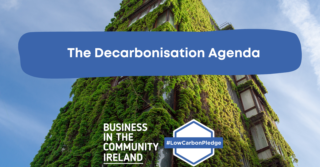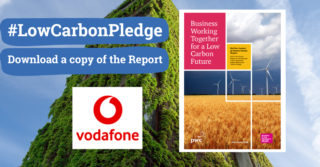External Perspective on the Climate Agenda and the Role of Business
Professor John Sweeney, Emeritus Profesor at Maynooth University offered us his insights and perspective on the climate agenda and the role businesses can play in addressing climate change.
Ireland’s commitment
The fight against climate change has to be a joint endeavour between nations, civil society and business. Earlier this year, the Irish government approved a climate bill that sets emission reduction targets in law and puts the country on a path to carbon neutrality by 2050. The proposed law would commit Ireland to cutting its emissions by 51% between 2018 and 2030 and to be net-zero no later than 2050. While this represents a significant step up in ambition, this commitment is simply a step towards aligning our decarbonisation rates with the Paris Agreement. In reality, Ireland as a developed country, is disproportionately responsible for the existing level of atmospheric carbon and the recently committed to 7% p.a. reduction should be considered a minimum level of reduction rather than an aspirational target. Exceeding this level would give some leeway to developing countries as they struggle to deal with the current and future impacts of climate change while in parallel looking to develop sustainably and navigate a pathway to net-zero.
Climate action with consumers at the core
Climate action has grown from modest roots, championed by small groups of informed individuals, to being something that now engages large portions of society. Today, consumers are much more informed as to the urgency of these issues, and they increasingly realise the power of their collective actions and buying behaviours.Consumers are recognising the seriousness of the climate and biodiversity emergencies and are putting pressure on companies to embrace more sustainable business practices. This very rapid mobilisation of consumer action can have very negative impacts on the viability of products or services that are not considered to be sustainable. The private sector in Ireland will have to respond in a proactive and transparent way to this ever-increasing consumer focus and ensure that their products or services are genuinely low carbon and strictly aligned with sustainable business practices. Today’s consumers are very sensitive to corporations’ claims that are considered to be ‘greenwashing’ and any perception that a company is exaggerating their environmental credentials is likely to have very negative commercial ramifications.
Role of policy-makers
While the citizen may fundamentally drive climate action, policy makers play a critical role in creating the enabling policy and regulatory environment which signals to companies, via both the ‘carrot’ and the ‘stick’, how low carbon behaviours are incentivised. Strong and consistent leadership on this topic is essential as policy certainty allows companies to take a longer-term perspective when making investments and formulating strategy. For example,
clear signposting on future increases in carbon prices may encourage companies to invest earlier in low carbon solutions. Policy makers also have a critical role to play in mapping out specific decarbonisation pathways for each sector. The specific sectoral pathways again provides clarity on what business practices will be more sustainable. In many cases this will require state investment in enabling infrastructure or support schemes or the removal of environmentally damaging subsidies. Examples would include adequate electric car charging infrastructure or financial schemes that support deep retrofitting of homes. The societal impact of any transition must also be carefully considered. Where any group of citizens is disproportionately disadvantaged, support schemes must be put in place to enable the retraining of the affected cohort. This is essential if we are to maintain continued societal support for the low carbon transition.
The role of business
The transition to a low carbon economy will be transformational for companies. Businesses that do not adapt quickly will be at risk, while those that respond rapidly will be better positioned to access the resulting opportunities. The most obvious starting point for any company is to assess their true carbon baseline covering scope 1, 2, and 3 emissions. Getting a true picture of the carbon emissions associated with each product or service allows the company to adequately plan for a zero carbon future. They then need to plan an appropriate pathway to net-zero which aligns to science-based targets. This alignment must include short term intermediate targets, such as annual reporting and management accountability. While internal governance arrangements are important it is vital that the company puts in place rigorous and transparent carbon reporting, which is externally validated, in order to give external stakeholders, including the consumer, confidence that the company is indeed on a trajectory to net-zero.
Download a copy of the full Low Carbon Pledge report.
Find out more about the Low Carbon Pledge.







